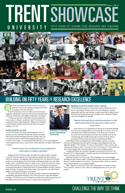
 |
 Best Selling Author, Historian and Professor Found his Career Inspiration at Trent
Dr. Tim Cook, one of Canada’s foremost historians, wasn’t sure he wanted to devote his life to the study of history – until he came to Trent. With both parents as historians, Dr. Cook arrived at Trent in 1990 with an open mind about his undergraduate degree options. It was the faculty members he met in the History department whose passion for their subject and for teaching drew him in. “Professors like Dr. Stuart Robson, Dr. John Syrett and Dr. John Jennings were so dynamic,” Dr. Cook says. “The mentorship they offered, and the chance to learn from experts, was the draw for me.” The political and cultural situation of the early 1990s was rich with possibility for Dr. Cook as a budding scholar. “It was a really interesting time for Canadian history – it was after Meech Lake, things were falling apart,” he says. “I thought I might become a constitutional historian. But then I took a class on the world wars with Stuart Robson – that put me on the trajectory that I’m on today.” Finding a home at the heart of the Canadian historical scene After attending Royal Military College for a master’s degree and pursuing his doctoral degree in military history, Dr. Cook has landed at the heart of the Canadian historical scene: working at the Canadian War Museum in Ottawa, where he has curated the First World War permanent gallery and other exhibitions since 2002. He also teaches at Carleton University, and has authored seven books, many of them award-winning, including Warlords, The Madman and the Butcher, Shock Troops, At the Sharp End, Clio’s Warriors, and No Place to Run. In 2013, he received the Queen’s Diamond Jubilee for his contributions to Canadian history and was awarded the Governor General’s Award for History (formerly the Pierre Berton award). His newest book, The Necessary War, is the first volume of a two book set to explore Canada in the Second World War. The second volume, Fight to the Finish, will be published next year. As Dr. Cook reflects on his accomplishments, he credits his education at Trent University for preparing him for graduate work and his outstanding career in his field. “The program gave me a very strong foundation for all the other things I’ve done in my life,” he says. Of the many skills he developed during his undergraduate degree, several have been key in his work. “The critical one, which I still hope is at the core of arts degrees, is being a good communicator. We want students to become good writers, to read widely and to be able to synthesize their thoughts,” Dr. Cook says. “Those are skills that I didn’t have when I came to Trent, but I did when I left.” Equally important is the ability to present research – that’s where seminars come into play, he says. “The real advantages of Trent were those small intimate seminars. You’ve got to be able to defend your arguments and discuss them intelligently,” he says. “We had professors dealing face-to-face with students in first or second year. We got to know them personally. That was a tremendous push for me to improve as a student.” Dr. Cook also has fond memories of his four years playing varsity rugby at Trent, where he built a strong camaraderie with his teammates, some of whom he is still in touch with 20 years later. “Those were other important skills that I developed outside of the classroom,” he says. “At Trent, everyone finds their own community – you find groups of like-minded people and that does so much to enrich the educational experience.” |

































